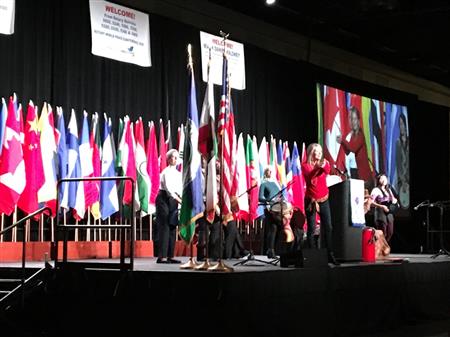
My presentation on the basics of peace journalism typifies this binary. I started my presentation with a discussion about low public approval ratings of the media, and the ills that plague the profession. Then my talk took a hopeful turn as I described peace journalism and its ability to create an atmosphere conducive to peace without compromising the principles of good journalism. A large, engaged audience showered me with perceptive questions both during and indeed after the presentation. One attendee wanted to know if anyone is practicing peace journalism. I mentioned the Guardian, Nicolas Kristof, and many radio journalists in Cameroon and Uganda as positive examples.
It was interesting to see many of the themes I touched upon in my talk echoed by other speakers at the conference. This includes the need to reject divisive “us vs. them” constructs, and to give a “voice to the voiceless” in everything we do.
The other speakers, many of them Rotarians, were truly amazing.
Azim Khamisa’s son was killed by gang members 25 years ago. Instead of retribution, he launched the Tarik Khamisa Foundation, dedicated to breaking the cycle of youth violence. “There is nothing quite as painful as a broken heart,” Azim Khamisa told the approximately 1,000 attendees. “But a broken heart is an open heart” that can be taught to embrace empathy and compassion, he observed.
Dr. Ira Helfand spoke movingly about the potential horrors of nuclear war, and of the need to eliminate all nuclear weapons. He urged the attendees to get involved in a group called Rotarians for a Nuclear Ban (On Facebook, search Rotarians4NuclearBan). Helfand’s organization, the International Campaign to Abolish Nuclear Weapons, won the 2017 Nobel Peace Prize.
Dr. Fazim Alvi broke the attendee’s hearts with horrifying, tragic stories about the Rohingya genocide in Myanmar. She has traveled on medical missions to refugee camps in Bangladesh that house Rohingya refugees. Alvi is haunted by the unsanitary, dangerous conditions there, and by the faces of children she met in the camps, including one she calls simply “girl crying” because she never got her name. “I can still feel her pain. Her eyes tell me stories of injustice…Her face is driving me to do this advocacy work,” Alvi said. She urged the audience to pressure the Myanmar government to end the genocide.
The conference featured dozens of examples of Rotarians working for peace. Rotarian Hardeep Girin from Australia discussed his initiative, “World Made Good,” that produces free videos for NGO’s that tell stories to benefit both the NGO and its clientele. An effervescent Barbara Muller discussed her initiative called peaceposcast.org, and urged her audience to launch their own peace podcasts. She also encouraged her audiences to get involved in the Rotary E-Club for Peace—www.
A large exhibition hall featured dozens of Rotarians and others eagerly passing out brochures about their outstanding projects, including a Russia-U.S. Friendship initiative; a variety of clean water projects; the Open World exchange program, the Rotary Malaria Symposium; Project Peanut Butter to battle malnutrition; Kherut, an anti-trafficking NGO; the Rotarian Action Group for Family Safety; Creating Friendships for Peace; Hands of Peace, an initiative uniting Israeli and Palestinian youth; the Free Wheelchair Mission, and the Rotarian Action Group for Peace (https://www.
While the conference underscored the great deal of work ahead for Rotary peacebuilders, it was a valuable reminder that those working for a peaceful world are not alone.
Steven Youngblood is the district 6040 peacebuilding ambassador, and an honorary member of the Parkville Rotary Club. He is director of the Center for Global Peace Journalism at Park University, where he is a communications and peace studies professor. Youngblood has taught peace journalism seminars and workshops in 27 countries. He can be reached at steve.youngblood@park.edu.